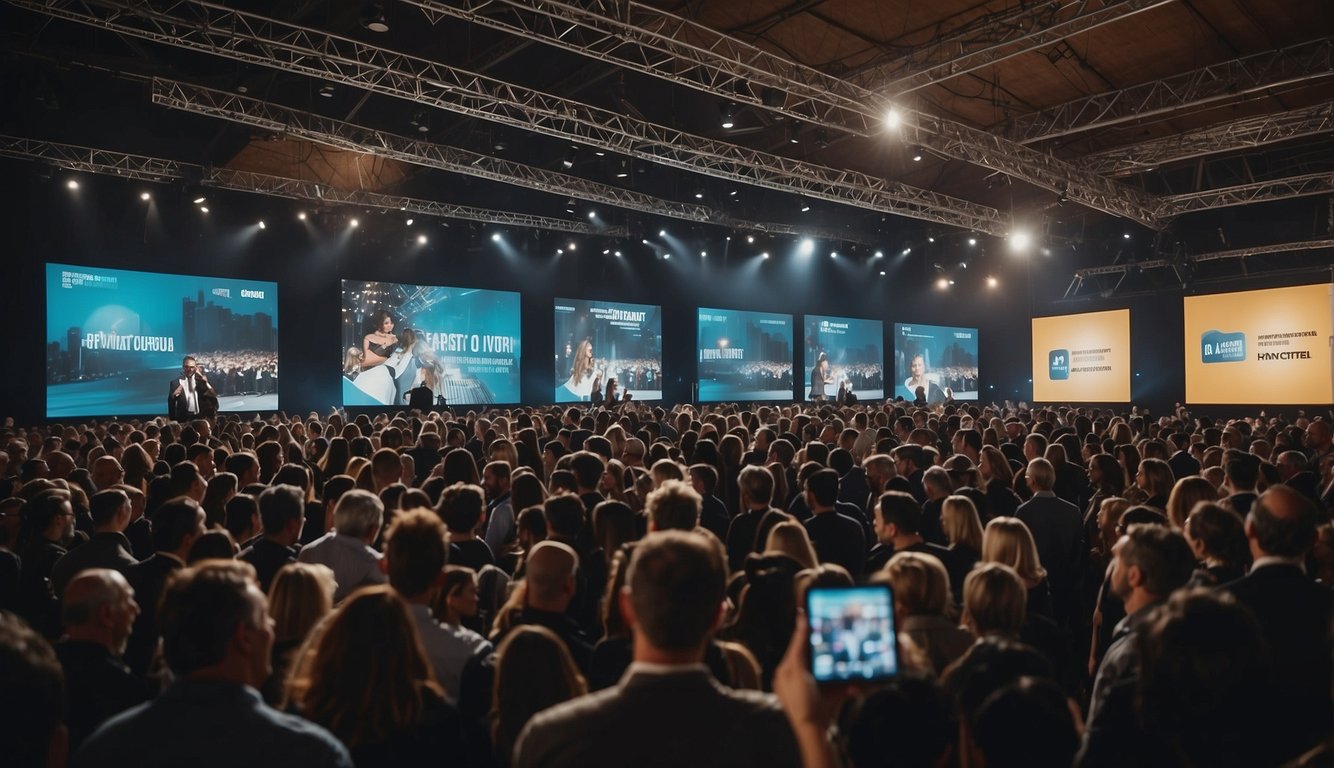After dedicating countless hours to engaging in online forum debates and browsing Pinterest collections, I’ve compiled a comprehensive manual on organizing events, a venture that instills a great sense of accomplishment in me. Crafting events is a blend of creative talent and detailed planning. Whether it’s small community events or large-scale conferences, the journey of making an event happen is both fulfilling and challenging.
The essence of a successful event lies in attention to detail. This guide covers everything from defining the event’s purpose and theme to the logistics of timing and location. While the process may seem overwhelming initially, breaking it down into smaller, manageable steps makes it approachable and achievable. Remember, the attendees’ experience is the accurate barometer of success, and this guide ensures that your event meets and exceeds their expectations.
Key Takeaways
- Successful events require a balance of creativity and structured planning.
- Attention to detail in logistics and experience design is critical.
- Post-event activities help extend the impact and value of the event.
Conceptualizing Your Event

When figuring out how to make an event, we must first solidify the concept. This is the backbone that will guide every decision we make—from the event name to the detailed agenda.
Defining the Event Type and Purpose
To kick off, we must pinpoint what type of event we’re hosting and why. Is it a seminar, a workshop, or perhaps a gala dinner? Understanding the purpose—whether it’s educational, fundraising, or networking—shapes our approach to all other aspects of planning.
Setting a Date and Location
Choosing the right date and location is critical. We want a venue that resonates with the event’s theme and is accessible to our attendees. The date should align with our target audience’s availability and avoid conflicting with major holidays or industry events.
Developing a Unique Event Name
Crafting a memorable event name sets the tone. It should capture the essence of the event while being catchy enough to stick in potential attendees’ minds. This name will be the anchor for our branding and marketing efforts.
Determining the Target Audience
Understanding who our target audience is allows us to tailor the content and format of our event. We’re aiming for a demographic that finds value in what the event offers, whether they’re industry professionals, community members, or specific interest groups.
Creating a Detailed Agenda
A clearly outlined agenda is the roadmap for our event. Attendees should know precisely what to expect. The schedule should list session times, breaks, networking opportunities, and special activities, helping attendees plan their participation effectively.
Planning and Organization

When we discuss how to make an event successful, it’s crucial to focus on meticulous planning and robust organization. This foundational groundwork sets the stage for every key decision and action.
Event Budgeting
An accurate event budget is the cornerstone of any successful event. Here’s a simplified budget outline we can use:
- Venue: Reserve a significant portion of the budget for the location.
- Vendors: Include costs for catering, decor, entertainment, etc.
- Marketing: Allocate funds for promotional activities.
- Miscellaneous: Always have a buffer for unexpected expenses.
Building a Project Plan
Creating a detailed project plan ensures every aspect of the event is accounted for. Consider these components:
- Timeline: Outlining each phase, from conception to post-event.
- Responsibilities: Clearly defining who handles what.
- Milestones: Setting mini-deadlines for major tasks.
Assembling an Event Team
The right event team can make all the difference. We need to assign roles based on:
- Skills needed: Match tasks with team members’ expertise.
- Availability: Ensure they can commit time to the event.
- Dynamics: Foster a collaborative environment among members.
Our organization can lay a strong foundation for the event by focusing on these areas.
Designing the Event

When we talk about how to make an event shine, it’s crucial to focus on design elements that reflect our brand’s personality and the message we want to convey.
Choosing Branding Elements
Branding sets the stage for any event. It’s essential that we select colors, logos, and themes that resonate with our audience and maintain consistency across all materials. For instance, if our brand identity is bold and innovative, we might choose vibrant colors and bold typefaces.
Customizing Event Programs
Customized event programs are the roadmap for attendees. Each program should include clearly outlined schedules, speaker information, and other activities. Canva is a versatile tool that allows us to craft professional-looking event programs with ease, ensuring our event’s branding is front and center.
Utilizing Templates and Apps
Templates can streamline the design process, saving us time and ensuring a cohesive look. Whether we’re putting together floor plans or creating marketing materials, leveraging templates and project management apps like Asana keeps us organized.
Merchandise and Promotional Materials
Interactive and visually appealing merchandise, like branded t-shirts or bags, can enhance attendee engagement. Using marketing tools to Share the event vibe and brand essence can also encourage attendees to become brand ambassadors. Remember to align all promotional material designs with our event’s branding for consistency.
Registration and Ticketing

When we understand how to make an event successful, managing registrations and ticketing efficiently is crucial. We’ll guide you through setting up seamless online registration, defining various ticket types, and adding promotional tools like promo codes and holds to enhance the experience.
Setting Up Online Registration
Setting up online registration is the first step to ensure attendees can easily sign up for our event. We aim to make this process as straightforward as possible by choosing a platform that offers customizable templates that we can tailor to match the style and needs of our event. The key is to ensure that the registration button is prominent on all event pages, thus making it simple for attendees to spot and act.
Determining Ticket Types
Determining the right ticket types is essential for providing options that cater to different attendees. Whether it’s VIP, general admission, or early-bird specials, each ticket type should offer a clear description and benefits so attendees can easily choose the best option for them. Setting a limit on each category also helps generate exclusivity and urgency.
Implementing Promo Codes and Holds
Lastly, making use of promo codes and holds can be a powerful tactic in our ticketing strategy. Promo codes encourage early sign-ups and increase the likelihood of selling out our event. We can create targeted promo codes to reward early registrants or hold tickets for special guests to ensure their participation. Implementing these methods not only incentivizes registrations but also helps us manage the allocation of tickets more effectively.
Marketing and Promotion

When we consider how to make an event successful, a robust marketing and promotion strategy is crucial. It not only increases visibility but also helps effectively engage potential attendees.
Crafting an Effective Marketing Plan
Firstly, we must lay a solid foundation with a well-structured marketing plan. This involves setting clear objectives, defining our target audience, and determining the marketing channels we’ll utilize. Our strategy should be detailed and actionable, encompassing various aspects of promotion, from online advertising to community outreach.
Developing Email Campaigns
Email marketing is a personal way to reach our audience. Segmenting our emails to cater to different groups within our target market is essential, ensuring that the content is relevant and engaging.
Engaging Through Social Media
Social media platforms are invaluable tools for promoting our event. We need to create consistent, creative content that resonates with our audience and encourages sharing. Regular updates, behind-the-scenes peeks, and interactive posts can increase our event’s visibility on social media.
Partnering with Sponsors
Sponsors can provide additional resources and credibility to our event. We need to identify potential sponsors whose brands align with our event’s values and then tailor our partnership proposals to highlight mutual benefits. We must maintain strong relationships with these partners before, during, and after the event.
Execution of the Event

When we discuss how to make an event successful, execution is where everything comes together. It’s the ‘showtime’ phase where all the planning we’ve done must seamlessly align.
Finalizing Event Details
Just before the event kicks off, ensuring that every detail aligns with our event information is crucial. This involves a last-minute scheduling check and confirming that communications systems are fully operational, especially for in-person events such as conferences or concerts.
- Checklist for Finalizing Details:
- Review the event schedule for accuracy
- Ensure all speakers, performers, and vendors confirm their times
- Double-check audiovisual and lighting setups
Coordinating on the Day
Coordinating our event handlers and staff on the day means being on top of real-time communications. We use methods like walkie-talkies or event apps to ensure everyone, from the floor managers to security, knows exactly what’s happening at any given time.
- Coordination Tools:
- Walkie-Talkies: For instant communication
- Event Apps: For updates and alerts
- Info Booths: For attendee inquiries
Managing Event Handlers and Methods
Effective management requires a clear hierarchy and an understanding of problem-solving methods. Whether there’s a schedule mishap or a technical glitch, having a team of well-briefed event handlers ready to respond is vital.
- Management Strategies:
- Have a clear chain of command
- Establish rapid response teams for unforeseen issues
- Regularly update event handlers about ongoing activities
By focusing on these areas, we can ensure that the execution of our event runs as smoothly as the finest symphony.
Post-Event Activities

Our job isn’t done when we’ve wrapped up an event. Now comes a crucial phase: post-event activities, which are key to our ongoing success and how to make an event even better next time. This involves gathering feedback, analyzing our event’s success, and showing appreciation to everyone involved.
Gathering Feedback
We need to understand how our attendees experienced the event. We usually send an email marketing campaign with a survey that invites guests to share their thoughts. This feedback is a collection of valuable insights that helps us refine future events.
- Email Surveys: Request detailed input on various aspects of the event, such as catering, speakers, and venue.
- Social Media Engagement: Monitor comments and post-event discussions on our platforms to get informal feedback.
Analyzing Event Success
Analyzing how well the event met our objectives helps us measure our event’s impact. We can see what worked and what didn’t by looking at the data.
- Engagement Metrics: Review open rates and click-throughs from our post-event emails.
- Attendance Data: Look at check-in numbers versus registrations to understand actual engagement.
Thanking Attendees and Sponsors
A sincere thank you goes a long way. We ensure that we send personalized emails or even handwritten notes to show our gratitude to attendees and sponsors.
- Personalized Emails: A thank you email to each attendee makes them feel valued and increases the chances of their return.
- Social Media Shoutouts: Publicly acknowledge sponsors and significant contributors on our social channels.
FAQ – How to Make an Event
What Are the First Steps in Planning an Event?
Start by defining the event’s purpose and objectives. Determine the target audience, set a date, and establish a budget. These foundational decisions will guide the rest of your planning process.
How Do I Choose the Right Venue for My Event?
Consider the size of your event, the location’s accessibility for guests, the type of event you’re hosting, and the amenities the venue offers. Ensure the venue aligns with your event’s tone and size.
What Should Be Included in an Event Budget?
Your budget should include venue costs, catering, entertainment, decor, marketing and promotional materials, staff and personnel expenses, and any technology or equipment rentals.
How Far in Advance Should I Start Planning an Event?
The lead time depends on the event’s size and complexity. Small events may need a few weeks to a few months, while large-scale events could require six months to a year of planning.
If you enjoyed reading about How to Make an Event, check out our other articles:
- Event Planning Basics 2024: 11 Steps For Your Next Big Event
- Event Planning 101: Mastering the Basics for Memorable Events 2024
- Event Trends 2024: Unique Trends Shaping the Future
- Business Event Planning Checklist 2024: Laying the Groundwork for Success
Feel free to also check out our other Articles from the category “Event Planning 101“ and don’t forget to follow us on Pinterest.












